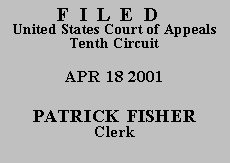

| ROBERT C. WHITTIER, | No. 00-7139
(D.C. No. 99-CV-508-S) |
Whittier raises two issues on appeal: First, he asserts that his conviction violates the prohibition against double jeopardy because both offenses arose from the same criminal act. Second, he alleges he was found competent to stand trial under a competency standard that was subsequently held unconstitutional by the Supreme Court in Cooper v. Oklahoma, 517 U.S. 348 (1996). The magistrate judge found, correctly in our opinion, that "petitioner first raised both of these claims in his second application for post-conviction relief." (Doc. 8 at 2.) Because Whittier failed to raise the claims on direct appeal or in his first application for post-conviction relief, the Oklahoma Court of Criminal Appeals was correct to procedurally bar them. See Whittier v. State, No. PC-1999-786 (Okla. Crim. App. Aug. 23, 1999).
Two issues of timing are relevant. First, Whittier contends that he asserted his claim of double jeopardy in his "addendum petition" to his first application for post-conviction relief. The magistrate judge found, to the contrary, that this addendum was filed on January 19, 1999, as part of his second post-conviction action. (Doc. 8 at 2 n.1.) We have found no evidence to doubt the magistrate judge's finding. Second, Whittier had the opportunity to include his Cooper claim in his first application for post-conviction relief because Cooper was decided on April 16, 1996, see Cooper v. Oklahoma, 517 U.S. 348 (1996), and Whittier filed his first post-conviction action on June 6, 1996. The Oklahoma Court of Criminal Appeals expressly found that Cooper "was decided before petitioner filed his first post-conviction application." (Doc. 8 at 3 (citing Whittier v. State, No. PC-1999-786, at 2 (Okla. Crim. App. Aug. 23, 1999).)
Consequently, for substantially the reasons stated in the magistrate judge's findings and recommended disposition and adopted by the district court, we decline to issue a certificate of appealability. See 28 U.S.C. § 2253(c).
ENTERED FOR THE COURT
David M. Ebel
Circuit Judge
*.After examining the briefs and appellate record, this panel has determined unanimously to grant the parties' request for a decision on the briefs without oral argument. See Fed. R. App. P. 34(f) and 10th Cir. R. 34.1(G). The case is therefore ordered submitted without oral argument. This Order and Judgment is not binding precedent, except under the doctrines of law of the case, res judicata, and collateral estoppel. The court generally disfavors the citation of orders and judgments; nevertheless, an order and judgment may be cited under the terms and conditions of 10th Cir. R. 36.3.